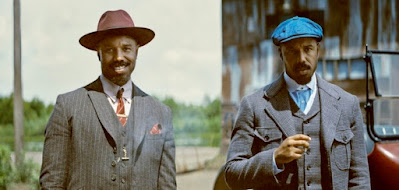Link to the n*de dudes
For movie night this weekend, we actually went to a movie in a theater, for a change: Sinners (2025), about twin brothers fighting vampires in the Mississippi Delta in 1932.
The first hour is quite naturalistic: Smoke and Stack (Michael B. Jordan in a dual role) return to the Deep Delta from their gangster career in Chicago with a lot of money and Irish booze, buy the old abandoned mill from a klansman who says he's not a klansman, and organize a juke party. We get the sense of the vast emptiness of the cotton fields, and the terror of everyday life for African-Americans in the Jim Crow South.
You had to be very careful; glance at or speak to a white woman, accidentally bump into a white man, and you would be attacked. Gay people live with a similar fear -- hold hands with your boyfriend or display a Pride flag, and you could get attacked or killed. But at least heteronormativity results in most gay people being assumed straight, so they can keep hidden in the riskiest situations. Most African-Americans could not.
The brothers pick up Preacher Boy (Miles Caton), who is torn between the church and the guitar (which his Preacher father calls Satanic). After he agrees to perform tonight, they split up.
Stack and Preacher Boy go to town, where they recurit another performer, the elderly, alcoholic Delta Slim (Delroy Lindo).
They hire shopkeeper Bo Chow (Yao) to make up signs and fry the catfish.
They pull Cornbread (Omar Miller) from the cotton fields to act as bouncer.
The brothers are so intimate that I was sure that one or both would be gay, but heteronormativity is running rampant. Both of them, and Preacher Boy, get girlfriends, whom they have s*x with, one after the other.
1. Stack with his ex-girlfriend Mary, who is an octaroon (one-eighth black), so Jim Crow laws still apply to her.
2. Smoke with his estranged wife Annie (Wummi Musaku). She's rather old , so I thought she was his mother until they started doing things.
She's also quite butch, so I figured that the actress must be a lesbian. LezWatch says that she is cisgender, unspecified s*xual identity, but she has played at least three queer characters.
3. Preacher Boy with Pearline, a married singer. Fortunately, her husband isn't around.
It keeps going like that. Bo Chow has a wife (we learn their favorite s*xual activity). Cornbread has a pregnant wife. Delroy Slim isn't married, but discusses the hetero exploits of his youth.
Left: Michael A. Newcomer, who plays a bartender in a white joint, is gay in real life.
Vampires after the break
The second hour begins with the Irish immigrant Remmick (Jack O'Connell) rushing across the fields, chased by Choctaw Indians on horses. Wait -- there were no Choctaws in Mississippi in 1932. They were forcibly removed in the Trail of Tears in the 19th century. These must be spirits.
Turns out that Preacher Boy is so good that his playing breaks into the spirit world and draws great singers from the past and the future: we see an ancient Chinese woman, a disco diva from the 1970s, and a road warrior from the far future.
But it also draws evil. So, is Rennick a spirit or a vampire, or a vampire spirit?
The three vampires try to get into the juke, claiming to be singers who "believe in equality," but having white people at a black party would be too risky. So they wait outside, and every time someone leaves, they kill and vampirize them. Seems like an inefficient ecosystem. Everybody you eat becomes your competitor for food?
Stack's wife, Annie, who is trained in hoodoo, figures out what's going on, and gives them the dets: vampires have to be invited in; they hate garlic and silver; they can only be killed by a stake through the heart, or sunlight. By this point, almost everyone has been vampirized. Tired of waiting, Chow's wife invites them in for a final confrontation.
The only gay subtext comes when Rennick the vampire tries to seduce Preacher Boy: "I want you. I want us to be together always." But he's evil, of course.
Preacher Boy slashes him with his silver guitar, and then the sun comes up, and the vampires all burn to death. You'd think a self-respective vampire would have thought of what to do with his new followers at sunrise.
Only Stack and Preacher Boy survive. Later that morning, the klan arrives to burn down the mill. I was wondering if they burned it down the night before, and all that stuff about vampires was just a hallucination. Stack kills them all.
Preacher Boy goes home to his Daddy, but decides to become a singer in spite of the evil. In a postlude, we see the elderly Preacher Boy, played by blues legend Buddy Guy, performing in 1992, and reuniting with the vampire-or-ghost Stack and his girlfriend (aww, heterosexual romance lasts forever). The end.








.jpg)
No comments:
Post a Comment
No offensive, insulting, racist, or homophobic comments are permitted.
Note: Only a member of this blog may post a comment.